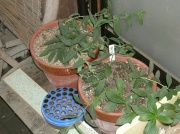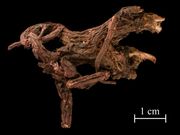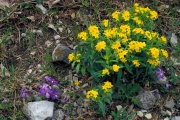Difference between revisions of "Gromwell root"
Jump to navigation
Jump to search
| Line 23: | Line 23: | ||
[[File:lithospermumpd1.jpg|thumb|Lithospermum spp.]] | [[File:lithospermumpd1.jpg|thumb|Lithospermum spp.]] | ||
| − | == | + | == Risks == |
Poor lightfastness | Poor lightfastness | ||
| − | == | + | ==Resources and Citations== |
| − | * ''Encyclopedia Britannica'', http://www.britannica.com Comment: "Boraginaceae." | + | * ''Encyclopedia Britannica'', http://www.britannica.com Comment: "Boraginaceae." Accessed 30 Sept. 2004 . |
* Website: http://www.reconstructinghistory.com/japanese/dyes.html | * Website: http://www.reconstructinghistory.com/japanese/dyes.html | ||
Latest revision as of 08:26, 9 August 2022
Description
A natural dye extract from the roots of the perennial Lithospermum plants, most common of which are L. erythrorhizon (Japan and China) and L. officinale (North America). The red-purple root of the Gromwell plant is extracted with water to produce a non-lightfast purple colorant composed primarily of the nathaquinone compound shikonin. Called waka or usu in Japan, this purple color was restricted to the Imperial family.
Examples from Uemera Dye Archive:
- http://cameo.mfa.org/wiki/Shikon_-_center_(3_C)
- http://cameo.mfa.org/wiki/Shikon_-_left_(234_L)
- http://cameo.mfa.org/wiki/Shikon_-_right_(234_R)
- http://cameo.mfa.org/wiki/Shikon_-_top_(236_T)
- http://cameo.mfa.org/wiki/Shikon_-_bottom_(236_B)
- http://cameo.mfa.org/wiki/Shikon_-_right_(237_R)
- http://cameo.mfa.org/wiki/Shikon_-_center_(238_C)
See also Puccoon.
Synonyms and Related Terms
murasaki (Jap.); shikonin; waka; usu; redroot; bloodroot ; Lithospermum erythrorhizon; Lithospermum officinale (stoneseed)
Risks
Poor lightfastness
Resources and Citations
- Encyclopedia Britannica, http://www.britannica.com Comment: "Boraginaceae." Accessed 30 Sept. 2004 .


